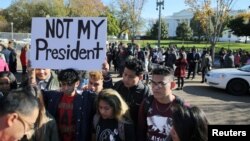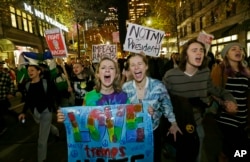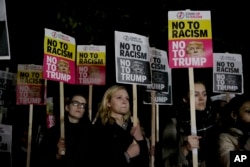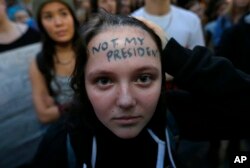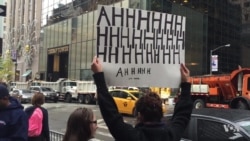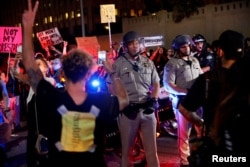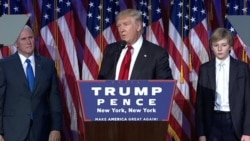President-Elect Donald Trump's victory in Tuesday's elections is being greeted by protests in several major U.S. cities.
Immigrants, people of color, refugees, and members of the LGBT community are among those protesting various positions their next president promoted during his campaign.
The organized protests against a president-elect in the days after the election are largely unprecedented.
In addition to New York City, where people demonstrated against Trump on Wednesday, more protests are planned in cities in blue, red, and swing states.
More than 1,000 people have shown interest on Facebook in a march in Louisville, Kentucky - the first state to be called for Donald Trump on election night.
The march has been organized by people who say they are "against racism, misogyny, transphobia, and xenophobia".
Facebook event
The Facebook event also includes a link to the American Civil Liberties Union of Kentucky, which details civilian rights during protests and demonstrations in the state, largely protected under the U.S. Constitution's First Amendment Right to Free Speech.
A smaller protest will take place in Boise, Idaho, a city and state that both voted for Trump on Tuesday. Dozens of residents committed to fighting "against him every day for the next four years" plan to meet outside the state's capitol building.
More than 2,000 people have said they will be attending a protest against Trump in Minneapolis, a blue city in the state of Minnesota, where Hillary Clinton edged out Trump.
The event description for the protest calls for a peaceful protest against climate change denial, building the infamous wall on the border with Mexico, and attempts to "roll back" women's and LGBT rights.
And in the critical swing state of Ohio, which voted for Trump, nearly 600 people have said on Facebook they will be protesting in solidarity with the African-American, LGBT, and Latino/a communities outside the state's capitol.
Anger over discrimination
Though a few protests, including an LGBT march planned in New York City, are being promoted by a specific community or with a specific platform in mind, many of the marches across the country are speaking out more broadly against discrimination, in protection of minority communities they say Trump attacked during his campaign.
Looking out further than this weekend, anti-Trump Americans have begun planning an inauguration day protest in Washington, DC.
On Wednesday, thousands of demonstrators took to the streets in New York, Washington, Miami, Philadelphia and Boston to protest Donald Trump's election victory. There were few reports of violence or arrests.
New York protest
A large crowd packed New York City's Fifth Avenue, directly in front of the Trump Tower where the president-elect lives, waving signs reading "Love Trumps Hate."
Another group gathered across from Trump's soon-to-be-home, the White House in Washington. Just down Pennsylvania Avenue, at the newly-opened Trump Hotel, protesters chanted "Say it loud, say it clear: Refugees are welcome here."
WATCH: New Yorkers react to Trump presidency
West Coast, Midwest
Demonstrations were also held in Los Angeles, Seattle, Chicago, Minnesota's Twin Cities, Omaha, Nebraska and Kansas City, Missouri.
Elsewhere on the United States' East Coast, demonstrations were held in Miami, Philadelphia and Boston, where protesters carried signs calling for Trump's impeachment and an end to the Electoral College, the constitutionally-established process that resulted in Trump winning the presidency despite his apparent narrow loss in the overall popular vote.
Even Texas, a solidly Republican state, saw demonstrations in its larger cities, including Dallas and the state capital, Austin.
In Oakland, California, demonstrators burned trash in the streets and some store windows were smashed.
No one from the Trump staff has commented on the protests.
Calls for unity
In his victory speech Tuesday, Trump promised to be a president for all Americans, saying "It is time for us to come together as one united people."
WATCH: Trump on uniting Americans
On Wednesday, Clinton told supporters at a gathering in New York that while the election results will be "painful for a long time," the nation must give Trump a chance to prove himself.
"We owe [Trump] an open mind and a chance to lead," she said.
WATCH: Clinton on supporting Trump
President Obama also called on the nation to put aside partisanship.
"We are not Democrats first. We are not Republicans first. We are Americans first," Obama said.




